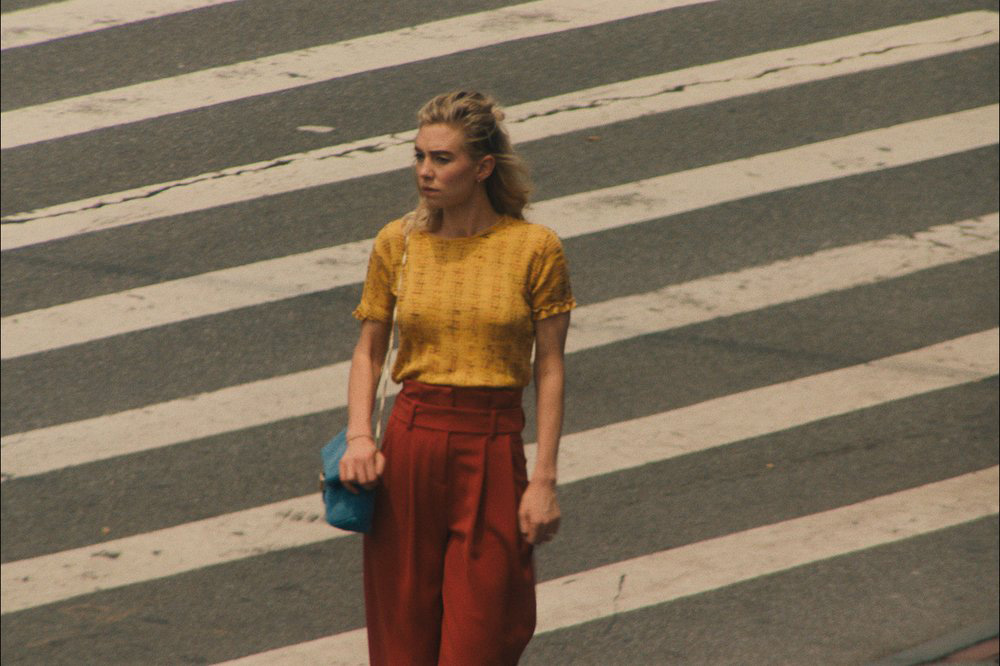There isn’t much for Alina (Vanessa Kirby) to hold onto in “Italian Studies,” so every fleeting moment spent adrift in New York becomes something to cherish.
“All my memories begin with me walking among these people and I don’t want anyone to take that,” she confesses to a virtual stranger in Adam Leon’s third film, in which it’s another stranger who informs her she’s actually a published author after spotting her on the street.
The typically ephemeral elements of the five boroughs have always made quite an impression in Leon’s films such as the capers “Gimme the Loot” and “Tramps” where the sweltering humidity of the summer in the city or all the different flavors of its cultural stew simmer to the surface, and in “Italian Studies,” those intangible sensations are all Alina can cling to as she navigates the terrain, suffering from memory loss that is at once terrifying but in some ways liberating when free of any memories of who she was, she can carve out a new identity. Falling in with a group of teenagers who have yet lost their idealism in a cynical world, she is able to experience firsthand the type of the discoveries that she can be seen once asking about in interviews for one of her books, a generation removed from her own days of being free of professional and familial obligations, and after happening upon a particularly adventurous young man (Simon Brickner) as a guide, a spiritual rejuvenation can occur as she starts to let go of any fears associated with her condition and precepts of how to be to live in the moment at hand.
It’s a feeling of exhilaration that not only comes through in the final product, but ran throughout the making of “Italian Studies” as Leon and crew convened on an unorthodox shoot that would film here and there over the course of a year, built around the busy schedule of the in-demand star of “Pieces of a Woman,” and take place across two continents with bookends filmed in London and the bulk of the film shot in New York. For Leon, whose previous films operated like finely-tuned Swiss clocks, it meant surrendering to circumstance much like his lead, throwing in an extra bit of unpredictability for himself by scouring the city with street casting looking for nonprofessionals to act against Kirby. The result offers escape to a place alive with opportunity, but also a provocative consideration of what a person is defined by and how they define themselves and with the film arriving in theaters and VOD following its premiere at the Tribeca Film Festival last summer, the writer/director spoke of how he could plan for such a production and let go of certain things to create such a lively drama.
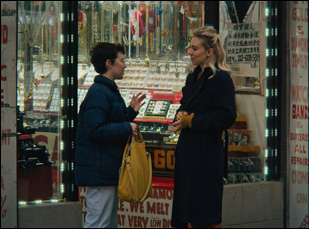
Yeah, two movies that are very much about how people get from point A to point B to Point C and really travel very logically through time and space. Then on “Tramps,” we would do rehearsals on literally a metronome to get the rhythm of that romantic screwball dialogue down. And we threw that out all for this. [laughs] Which, to your point, was so freeing and unexpected in a lot of ways that I was excited about. I wasn’t looking for it. But it felt like the right way to tell this story and in doing so, we had a blast.
Usually, I write and rewrite the script a hundred times, develop it with people, work on it for years. But this was something where Vanessa [Kirby] and I wanted to work together and she had this availability that was piecemeal over the course of a year, so we started to think about what was something that we should shoot that way? I didn’t want to just do an improv movie or do a movie where we should do this on an eight-week shoot, so started more with what do we have and how can we make this? And I really do think it ended up being the best creative experience of my life. I’m so grateful for it.
With the piecemeal nature of the shoot, could you actually get parts in the can and reconsider what the movie was telling you what it wanted to be?
Yeah, it’s interesting while we were in post-production, I looked at the original script and our lookbook, which went through what this movie is, and we really made the movie we intended to make. Simon [Brickner]’s role got bigger, but it’s pretty much exactly the same in terms of the overall beats of the story and the bookend of London, and what the themes are and how we were going to shoot it because I can’t really do it any other way. But I love additional photography. It’s something I’ve budgeted for on “Loot” and on “Tramps,” and I made this joke, which was true though that we shot for three days and then we shot three weeks later for six days, so the whole thing was additional photography. That was cool, especially in the gap between the summer shoot, which was nine or ten days and the winter shoot, which was 12 days, [where] we had four or five months to edit all the footage we had, know what was missing, talk about what we wanted to add, what we maybe wanted to change, what was working with performances and what wasn’t, so we went into a writers’ room to come up with this and then we went into a writer’s room again.
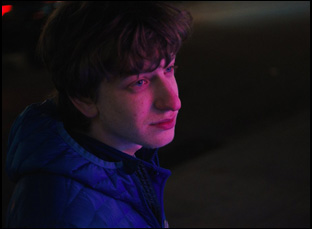
Yeah, it was fun and a big leap of faith for everyone, including me and it was really an interesting challenge for Vanessa because she did a lot of research, but it was hard for her to research her character because her character doesn’t know who she is. Vanessa really wanted to hold onto that, and she had so much input on the story and the feeling overall, but on Alina, [for example] normally, I would really work with the actors a lot on their wardrobe and she was like, “I don’t think I should be involved because I don’t know why I’m wearing this.” For the London [sequences], it was very different. There was real character biography and all that, but there was this big leap of faith [for those New York scenes] and because of that, I think we very purposefully made the first three days, “Let’s throw you out into the streets, let’s have you process the world around you and we capture that because it’s so much of what this movie is at its core.” It’s almost a semi-rehearsal in some ways. I don’t want to cheapen it because it was production and essential to the story, but it allowed us to find our footing.
Did she know who she was going to act against at any given moment? You get that live energy on camera, so I wonder how much you wanted a collision to happen right in front of you.
It was something we talked about and we wanted to find a balance with that because we didn’t want the kids to be intimidated by the moment. She came to New York in June and she met with some of them because I think it was important, both for the kids and for her. She was very, very excited when she met the kids, but she didn’t want to overwork with them, so I was doing a ton of rehearsal with them and relaying things in our calls while she was in London.
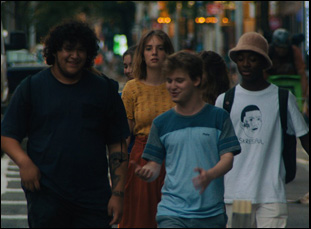
Yeah, particularly Simon. I worked with him before on a live show and we’re like “He’s such an interesting guy, let’s just throw him at [Alina] at the party.” As we rehearsed with him and worked with him more, we were just very taken with what was happening and what he was bringing was in tune with the story, so his role developed from being one of the kids to *the kid.* Then Annabel Hoffman plays Lucille the singer and I knew what a talented singer she was, but she was only available [one day] on August 9th, so it was like we’re not going to make your character one of the kids, we’re going to make your character this separate thing [because] I knew I wanted to get her involved. But how? Okay, she’s this ethereal idea that Alena is chasing from her story, so it was this combination of people’s practical schedules, the nature of the story, and the nature of the production.
It seems like the idea of having these kids with their unbridled authenticity collide with Alena trying to hide her condition must’ve been central, but how early did that click in?
It was something that certainly we talked a lot about, but I don’t like to shoot for the theme. I like to shoot for the story and for the character. We talked a lot about being present and what we put on when we’re with people and [in] our environment and how the people we’re with can affect who we are. We’re the person that we’re drunk with with our friends [but] we’re [also] the person that is on this [interview] call — we’re all of that. We also felt that the interview space in the movie allowed for something that we weren’t getting access to, which was Alina being honest with herself and with others because she’s so protective of what’s happening to her in New York. She doesn’t want anyone to know and then when she’s in London, she’s protective in a different way — at first in a very typical cosmopolitan, “I’m here with my husband, he’s here on work and I’m going to be nice and be chipper and play that part” [way] and then with Annika at the end [where] she opens up a bit, very protective of what has happened to her. The interview spaced allowed for that authenticity from her and we were obviously getting a lot of that authenticity from the teenagers inherently.
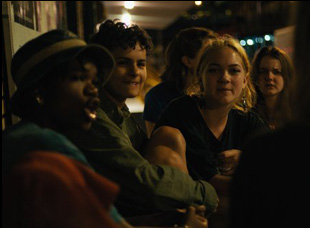
We knew what the story was — that it was about memory — and how we were going to tell it through her perspective — that we were going to be in this dissociative state with her. That was very much there, but we also knew we were going to be shooting a lot of footage and crafting that in the edit, so there was a lot of time spent finding the balance between the interviews and between her stories [in New York and London]. There were a couple more segments in her stories and we had the stuff with Maya Hawke in there, so what that balance was going to be was something that we discovered more in the edit than I would say I’ve done on my previous movies, but it wasn’t like discovering what this movie was in the edit.
It must’ve been wild to get this filmed in the streets before the pandemic and see what you had on your hands.
It’s interesting because when the pandemic hit, we were wrapped and pretty deep into the edit, so I was able to finish with my editor over lockdown in that first summer, but things went slowly and we had to work around people’s schedules and get a sound mix done — we were doing it in London, but I couldn’t do it in London obviously, so there were challenges there — but they were not the challenges that other people have had since. And at first, we were like, “Oh wow, we have a period piece now.” But then it became more like, “Oh we have something that is really tapping into a lot of feelings of this moment” as this pandemic went on. People, as we would show it to them, were really grabbing onto that and it’s a movie that can grab people or cannot grab people and I knew that when we were making it, but it’s really exciting when it does connect.
“Italian Studies” opens on January 14th in Los Angeles at the Monica Film Center and the Pasadena Playhouse 7 and New York at the IFC Center. It is also available on demand.




